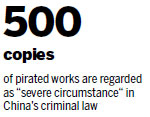Business, officials come together to fight against piracy
Industry insiders praised joint efforts among law enforcement, filmmakers, cinemas, consumers, international organizations and lawmakers to combat piracy at an entertainment intellectual property workshop at the second Cyber Security Responsibility Forum on Nov 24 in Beijing.
The event gathered more than 200 professionals and experts to discuss the challenges involved in copyright protection in the recreation sector.
Earlier in September, a case of copyright piracy was cracked when police arrested the principal suspects in cooperation with China's online game maker Tencent Holdings Ltd, one of the rights holders.
Their cooperation aimed at identifying intellectual property in suspected films on BT Tiantang, a website of pirated videos.

Further cross-border cooperation was undertaken as officials contacted US filmmakers, including Warner Bros Entertainment Inc and Universal Studios Inc, via the Motion Picture Association of America's China office.
Similar crackdowns of national influence have been made, as lawsuits against two more suspect groups have been filed by officials in Chengdu, Sichuan province.
Challenged with a huge burden of proof, Chengdu officials have also called for assistance from other relevant institutions, including the State Administration of Press, Publication, Radio, Film and Television, and the National Copyright Administration.
"Without previous cases as models to follow, we often seek help from involved parties," said Qi Ming, deputy chief of police of Shuangliu district in Chengdu.
"Most suspected works - the copyright owners of which should be contacted to confirm their nature - are produced by foreign filmmakers, which may result from the fact that overseas companies create alliances for protection, while their Chinese peers often have to fight on their own against copyright infringements," said Zheng Yang, an official at Huai'an police department in Jiangsu province, who is in charge of cyber security.
"We appeal to IP holders, consumers, officials and legislators to work together to safeguard IP," he added.
Despite the breakthroughs made in IP protection, problems remain as rights owners find it difficult to confirm a piracy crime on their own.
According to a judicial explanation issued by the Supreme People's Court and the Supreme People's Procuratorate in April 2007, making 500 copies of pirated works is regarded as a "severe circumstance" in criminal law.
The threshold was previously 1,000 copies. Although the number has dropped by half, it is still difficult for the rights owners themselves to find evidence of the 500 illegal copies, said Peng Wei, director of copyright protection at the MPAA's China office.
The market shares responsibility in safeguarding IP, too, said Peng. "Cinemas are highly encouraged to apply digital watermarking technology that could track all piracy inside the theater," he added.
Non-commercial use of unauthorized works will also be treated seriously, according to the third revision of China's copyrights law, said Rui Songyan, a judge at the Beijing Intellectual Property Court.
Zhao Jie, director of IP management and enforcement at the NCA, said the official body will strengthen law enforcement while deepening cooperation with departments including the cyberspace administration and the police.
"The strong partnership of internet companies, professional associations and IP holders is highly recommended, " Zhao said.
|
More than 168,000 illegal publications including pirated videos are destroyed in Taiyuan, Shanxi province, on April 21.Deng Yinming / For China Daily |
(China Daily 11/30/2016 page17)

























